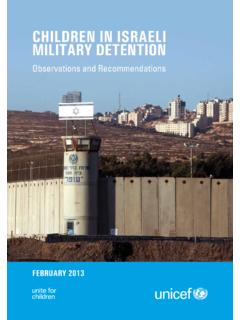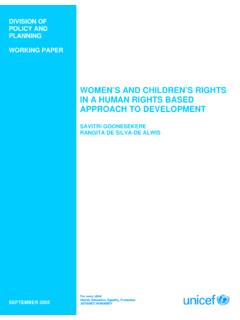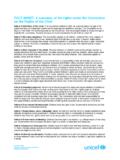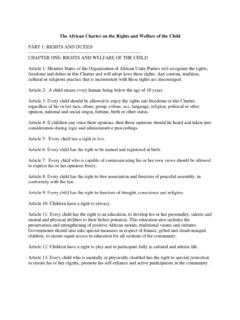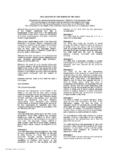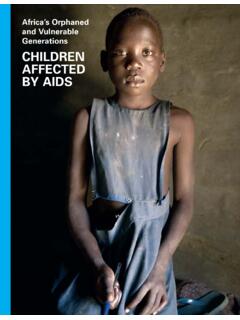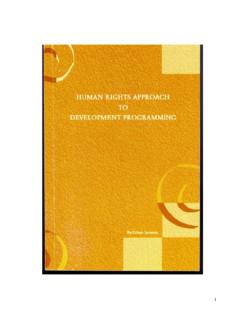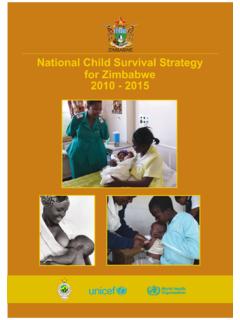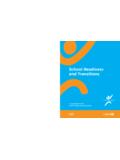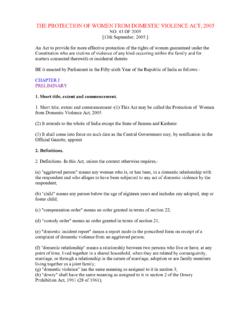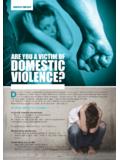Transcription of Against - UNICEF
1 Ending violence Against Women & Girls Evidence, Data and Knowledge in the Pacific Island Countries Literature Review and Annotated Bibliography August 2010. UNIFEM Pacific Sub-Regional Office Level 5 - Vanua House Victoria Parade Suva, Fiji Tel: +679 330 1178. Fax: +679 330 1654. Ending violence Against Women and Girls: Literature Review and Annotated Bibliography. Copyright: UNIFEM Pacific, August 2010. ISSN: 2219-7133. Ending violence Against Women & Girls Evidence, Data and Knowledge in the Pacific Island Countries Literature Review and Annotated Bibliography August 2010. FOREWORD. violence Against women and girls is a widespread and systematic violation of fundamental human rights violations and an enduring form of gender based discrimination.
2 It occurs in every country of the world, rich and poor, stable and in conflict, and affects most women and girls, regardless of their age or socio-economic status. Every government especially through political, administrative, and justice structures, mechanisms and processes is accountable to end society's tolerance of and states' lack of responsiveness to this pervasive scourge on society. Worldwide, women are vulnerable and at risk enduring emotional and psychological trauma through harassment, terror and threats, intimidation, humiliation, degradation, exploitation and physical, especially sexual, injury, maiming and disability, all with chronic health consequences even death. This extreme expression of male control and power over women often begins at infancy and may accompany a woman throughout her life to old age, through various relationships as daughter, sister, intimate partner, wife and mother.
3 All forms of violence Against women and girls occur around us on a daily basis, in our homes, families, communities, institutions, workplaces and in the songs, films and images of popular media. The institutions of Government, culture, religion, civil society and commerce are not immune from gender based violence within their own structures and organizations, among their members and constituencies. It is not only the common man', the grassroots, uneducated or poor man, who commits violence Against women. Doctors, lawyers, judges, parliamentarians, policemen, security guards, senior public servants, chiefs, priests and pastors, teachers and nurses commit crimes of violence Against women, in their personal and professional lives, often betraying their trusted roles as partners and as providers of services intended to lead, guide, comfort, support and protect.
4 Who can women turn to? Who can women trust? We are all are accountable to unite to end violence Against women. The right to live a life free from violence is a right that all women must demand a right that all men must accord them. violence Against women denies women their most basic rights and freedoms, including freedom of opinion, equality and justice before the law, to marry (or not) according to their own free will, to mobility, participation, to vote, to have access information and education, to work, to be employed. Most UN Member States have committed themselves to ending gender based discrimination and ending violence Against women through ratification of CEDAW, and by signing on the Beijing and Millennium Declarations and UN Security Council Resolutions that address the gendered dimensions impact of conflict (UNSCRs 1325, 1820, 1888 &1889).
5 It is time to close the gap between commitment and action in the form of laws, policies, services and budgets to provide adequate protection and access to justice. Too many Pacific women and girls experience violence in their lives. The call to acknowledge, address and act to end all forms of violence Against women and girls is not new in the Pacific region. For two decades we have campaigned, lobbied, organized and acted on many fronts. In particular, civil society organisations have initiated solid and innovative programmes in urban and rural centres. Through the Family Health and Safety Studies, implemented by the Secretariat of the Pacific Community (SPC) and funded by UNFPA and AusAID, we now have quality, comprehensive and comparable data and strong and alarming evidence of the high prevalence and severity of violence committed Against women by their intimate partners and by strangers.
6 Studies in Samoa, Solomon Islands and Kiribati have identified high rates and severe consequences of violence Against women. Comparable studies are nearing completion in Vanuatu and commencing in Fiji. We know that women living with disability and HIV, women who are homeless or selling sex, have an increased vulnerability to sexual and other forms of physical assault as well as psychological violence . We also have evidence in our region of women's increased vulnerability to violence , including crimes of sexual violence during times of conflict, political instability, natural disasters, and social upheaval, particularly when there is internal displacement of people. We know that rape and other forms of sexual violence are used as a weapon in regional, national and ethnic conflict, and as an expression of anger, frustration, payback and revenge at family and community level.
7 We know that this is in turn related to the rapid transition and upheaval of traditional communities occurring in Pacific societies and the pervasive gender blindness and denial of i women's suffering. This is happening in the context of challenging family and cultural structures, new social and sexual norms and behaviors, and where the rule of law access to justice is operating at a very low level or is ineffective. Pockets of our region experience specific forms of violent crimes committed Against women that are related to beliefs in magic and sorcery, HIV and AIDS and cultural clashes with rapid urbanization, globalization of media, the incursion of large scale resource developers and vast workforces of men, into remote and under-developed regions and migration which disrupts and separates families.
8 We know too, that a clash of cultures and a lack of education can be manipulated in political and economic rivalry, and that aspects of traditional cultures that discriminate Against and harm women are now being generalized, distorted and manipulated so that women are too often the scapegoat for men's problems and the victims of men's power struggles. We have the evidence. We need the resources. Over the past two decades we have witnessed excellent regional level outreach and services to strengthen knowledge, and capacity in advocating for law reform and to strengthen service delivery. The Fiji Women's Crisis Centre (FWCC) and Regional Rights Resources Team (RRRT) have provided us with high level expertise and strategic guidance. The Vanuatu Women's Centre, the Family and Sexual violence Action Committee in PNG, and a mass of medium-sized and smaller organizations are emerging at national and local levels, making their best effort to reach out to all classes of women in need, even to the most remote outer islands and mountain and swampland communities.
9 We know that there is an urgent need for more knowledge, information, data and coordination and access to financial resources and opportunities to develop knowledge and skills to recognize the strategic value of a rights- based and gender responsive approach to addressing and eliminating violence Against women. Moreover, capacity to absorb and manage funds and programmes accountably and effectively must be strengthened. There is still much to be done by governments, as duty bearers on the supply side of the equation. Likewise consciousness raising and confidence building, up-skilling and up-scaling of citizens and civil society as rights holders, must occur on the demand side. All governments are accountable to close the gap between national commitments to gender equality and the empowerment of women by ensuring adequate new laws, policies, budgets to ensure access to justice and protection systems and services.
10 UNIFEM will work together with all committed agencies for a safe, secure and peaceful region, in which women and girls are free from violence and abuse, free to fulfill their potential as equal and capable citizens, in all forms of social, economic and political life. UNIFEM firmly believes that ending violence Against women can unleash the full potential of women's empowerment and gender equality to end poverty and foster human rights, peace and development for all in the Pacific region. This summary of all current literature on violence Against women in the pacific region, is designed to give practitioners a concise and comprehensive overview of current knowledge and analysis. The evidence presented in this first edition presents a compelling case for more action and investment in preventing and responding to violence Against women.
